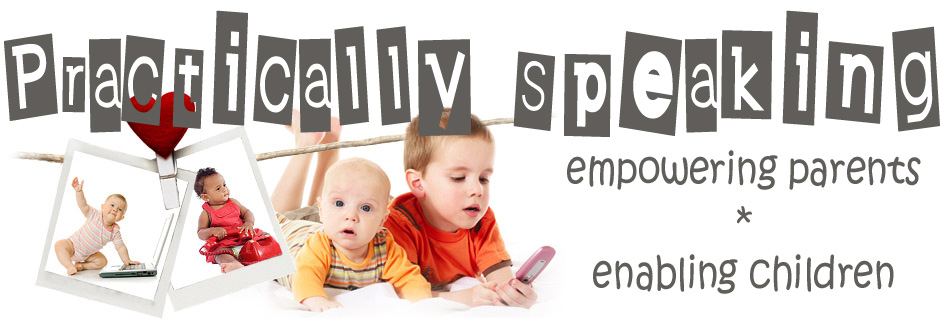There is a saying that goes 'children are like little sponges, sucking up everything around them', and in fact, I've read that young children love learning so much that they'd actually rather learn than eat. As parents we know that it's our role to teach our babies and children everything they need to know, and this can be rather daunting, especially considering that we really don't have a whole lot of extra time to spare.
The good news is that there is practially a step-by-step recipe to help make the time spent with your child so much more valuable and effective. So, remember the following points when you're next with your baby or child and see how their learning blossoms.
First... add a good dollop of emotion
We've learned in previous posts how important your love is in any learning situation (if you missed the post, go here). It is like the glue that sticks the learning in place. To amplify the emotional input, make every experience animated, with larger-than-life expressions on your face, talk in funny voices, cuddle and play rough and tumble. Think big, make sure that you're also having fun and you can't go wrong!
Second... continually sprinkle language
Think of yourself as a sports commentator, running a continuous commentary on what you and your baby are doing, thinking and feeling, and what is going on in the world around you... Just giving your baby the words for what's going on around him or her is invaluable.
Remember always that language is what sets us apart from the animal kingdom, and what gives human beings the edge. We think in words, and without them we don't have any understanding or insight into what's happening in ourselves and in the world around us.
Language adds logic to your baby's world - by talking to him about everything you are 'translating' his world for him.
Third... add a pinch of contrasts
Babies and children find it much easier to understand a concept if both opposites are present. If you want to teach your baby what 'big' is, show him both big and small - let him literally hold a big ball and then a small ball in his hands. If you want your child to understand what soft is, show him both soft and hard and so on and so forth.
Fourth... repeat and repeat again
Just like grown ups, babies and children learn best through repetition, and repetition promotes recognition - which is a very handy intellectual skill. This means that you'll be helping your child to recognise something if you repeatedly discuss 'defining features', for example, that a dog has four legs, fur, a big nose and says 'woof', or that a bird has feathers, two legs, a beak and says 'tweet'.
Constantly naming and describing things will help your baby to learn about the world around him, in which he's bombarded with new things almost every day.
Fifth... add a heaped serving of demonstration
Babies and children live in the moment and are very physical beings. They learn through experiences and from their bodies. They learn faster when something is demonstrated to them.
If you want your baby to learn the difference between square and round, let them touch a block and describe the four corners and then touch a ball and feel the round-ness of it. If you want them to learn big and small, try putting a small ball through a medium sized hole and see it go through and then putting a big ball through the hole and they'll notice it can't fit. Try learning numbers through clapping hands 1... 2... 3... Or stacking blocks 1... 2... 3...
The idea is to show them and let them experience physically what you're trying to describe, for example, taking their hand and showing them how to stroke the cat softly is much more understandable than just giving them the instruction.
So, teaching your baby and child is not so difficult if you remember to add emotion, give them a running commentary, teach them concepts through contrasts, repeatedly point out defining features of things in the world, and demonstrate what you want to teach them in a practical real-life situation.
Have fun with your little ones, explore the world through their beautifully fresh eyes, imagine the wonder and joy of learning something new, every day...
Words: Loren Stow
when we know better... we do better
*Practica Parents: It adds a lot of fun and conviction to the activities we do as part of the Practica Program if we know WHY the activities have been selected and put together in the way they have been. When you page through your guide and read the individual activities, it'll be interesting for you to see how each one of them in one or other way reflects at least one of these five important teaching tools.
If you would like to receive an email each time the blog is updated, please email lizette@practicaprogram.co.za









1 comment:
Great guidelines, thanks a lot!
Post a Comment